Analysis of Social Institutions Through Sociological Theories
VerifiedAdded on 2023/05/28
|8
|1930
|431
Essay
AI Summary
This essay provides a comprehensive analysis of social institutions, focusing primarily on educational institutions, through the application of classic sociological theories. The paper begins with an introduction to social institutions and their significance, followed by a detailed examination of three key sociological perspectives: functionalism, conflict theory, and symbolic interactionism. Functionalism is explored, highlighting its emphasis on the interconnectedness of societal elements and the positive functions of educational institutions. Conflict theory is then discussed, presenting the perspective of society as divided into groups in continuous conflict, particularly in the context of class inequality within the education system. Lastly, symbolic interactionism is explored, emphasizing the role of interaction and subjective meaning in shaping human behavior within educational institutions. The essay concludes by synthesizing the different perspectives and underscoring the continuing relevance of these sociological theories in understanding contemporary social phenomena.
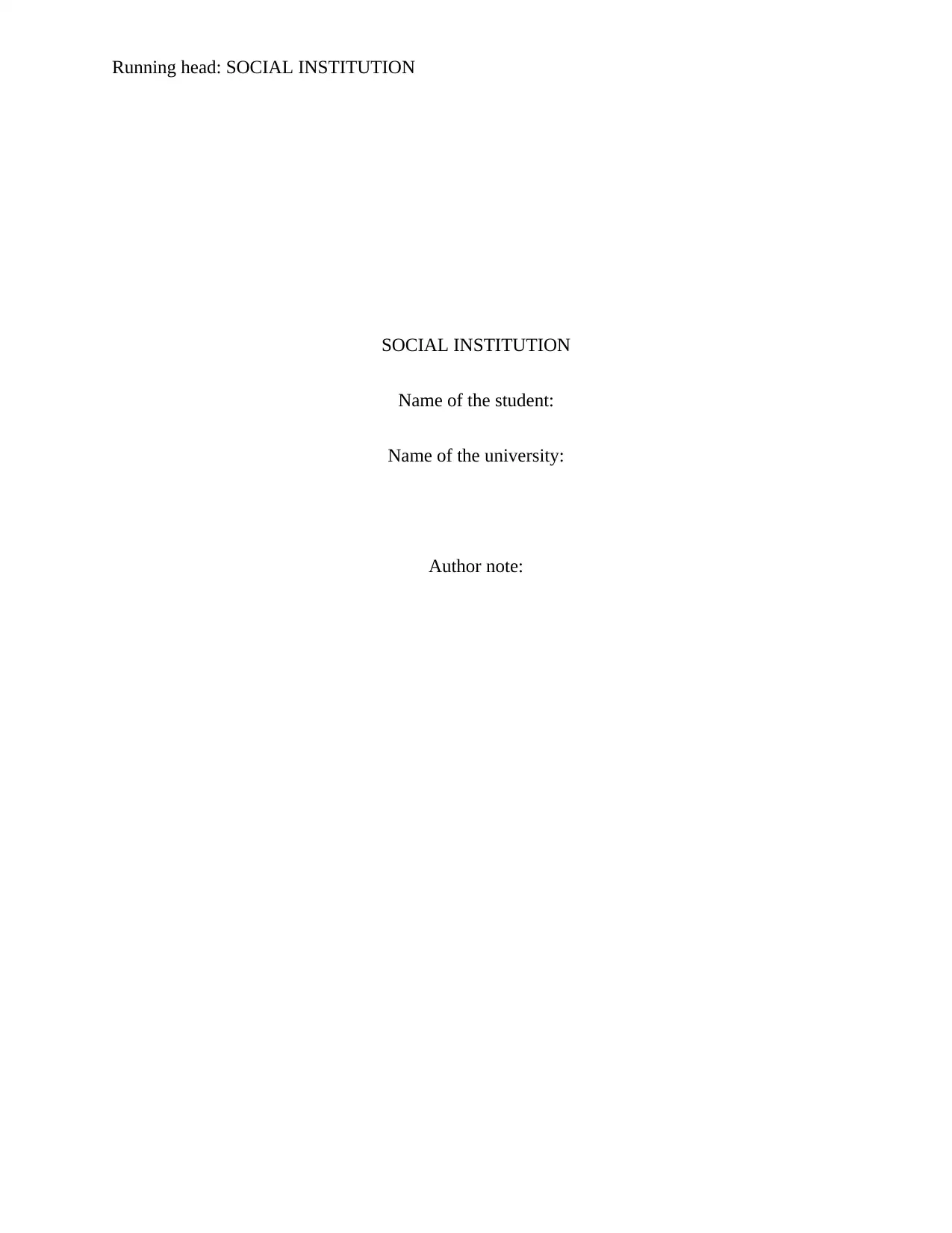
Running head: SOCIAL INSTITUTION
SOCIAL INSTITUTION
Name of the student:
Name of the university:
Author note:
SOCIAL INSTITUTION
Name of the student:
Name of the university:
Author note:
Paraphrase This Document
Need a fresh take? Get an instant paraphrase of this document with our AI Paraphraser
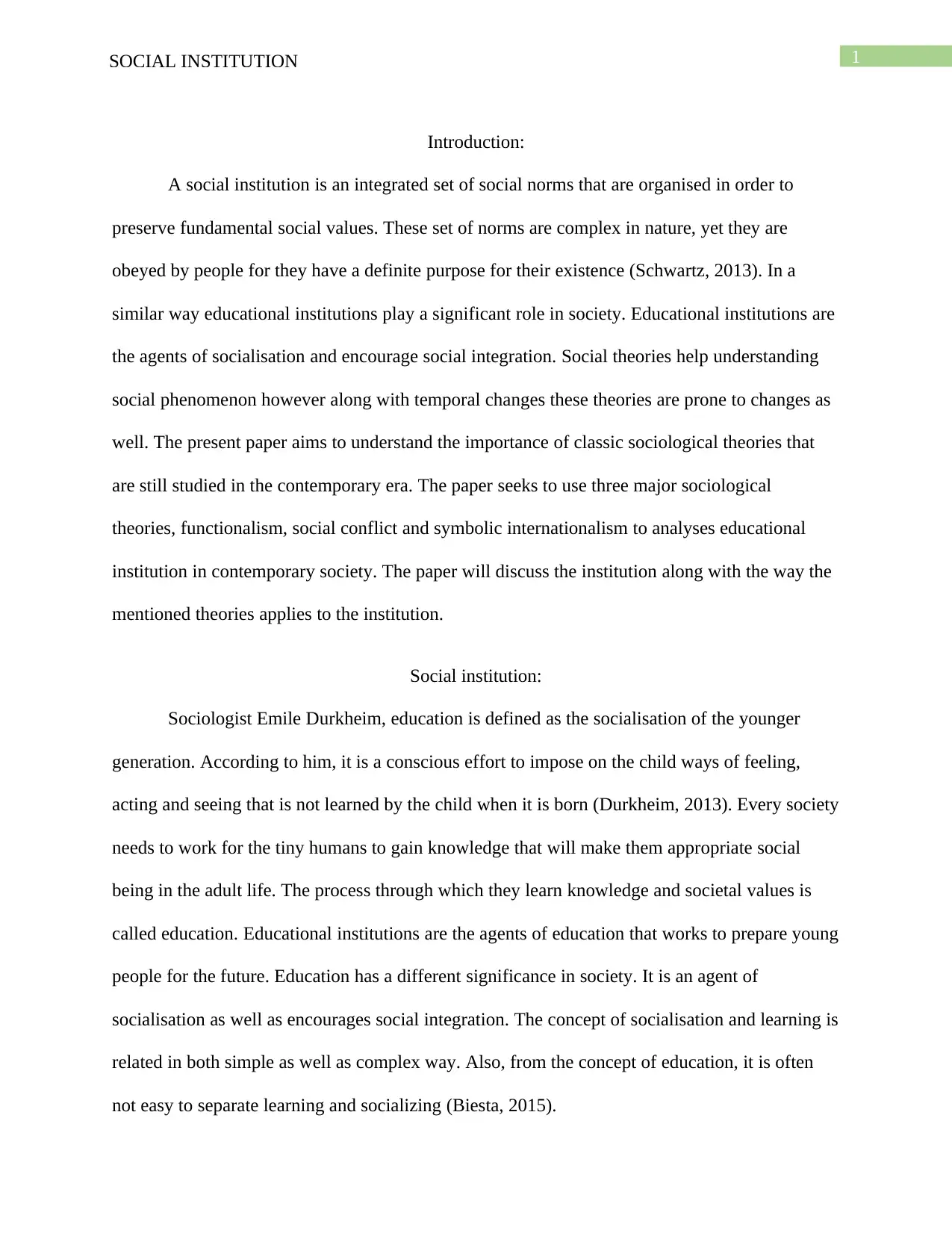
1SOCIAL INSTITUTION
Introduction:
A social institution is an integrated set of social norms that are organised in order to
preserve fundamental social values. These set of norms are complex in nature, yet they are
obeyed by people for they have a definite purpose for their existence (Schwartz, 2013). In a
similar way educational institutions play a significant role in society. Educational institutions are
the agents of socialisation and encourage social integration. Social theories help understanding
social phenomenon however along with temporal changes these theories are prone to changes as
well. The present paper aims to understand the importance of classic sociological theories that
are still studied in the contemporary era. The paper seeks to use three major sociological
theories, functionalism, social conflict and symbolic internationalism to analyses educational
institution in contemporary society. The paper will discuss the institution along with the way the
mentioned theories applies to the institution.
Social institution:
Sociologist Emile Durkheim, education is defined as the socialisation of the younger
generation. According to him, it is a conscious effort to impose on the child ways of feeling,
acting and seeing that is not learned by the child when it is born (Durkheim, 2013). Every society
needs to work for the tiny humans to gain knowledge that will make them appropriate social
being in the adult life. The process through which they learn knowledge and societal values is
called education. Educational institutions are the agents of education that works to prepare young
people for the future. Education has a different significance in society. It is an agent of
socialisation as well as encourages social integration. The concept of socialisation and learning is
related in both simple as well as complex way. Also, from the concept of education, it is often
not easy to separate learning and socializing (Biesta, 2015).
Introduction:
A social institution is an integrated set of social norms that are organised in order to
preserve fundamental social values. These set of norms are complex in nature, yet they are
obeyed by people for they have a definite purpose for their existence (Schwartz, 2013). In a
similar way educational institutions play a significant role in society. Educational institutions are
the agents of socialisation and encourage social integration. Social theories help understanding
social phenomenon however along with temporal changes these theories are prone to changes as
well. The present paper aims to understand the importance of classic sociological theories that
are still studied in the contemporary era. The paper seeks to use three major sociological
theories, functionalism, social conflict and symbolic internationalism to analyses educational
institution in contemporary society. The paper will discuss the institution along with the way the
mentioned theories applies to the institution.
Social institution:
Sociologist Emile Durkheim, education is defined as the socialisation of the younger
generation. According to him, it is a conscious effort to impose on the child ways of feeling,
acting and seeing that is not learned by the child when it is born (Durkheim, 2013). Every society
needs to work for the tiny humans to gain knowledge that will make them appropriate social
being in the adult life. The process through which they learn knowledge and societal values is
called education. Educational institutions are the agents of education that works to prepare young
people for the future. Education has a different significance in society. It is an agent of
socialisation as well as encourages social integration. The concept of socialisation and learning is
related in both simple as well as complex way. Also, from the concept of education, it is often
not easy to separate learning and socializing (Biesta, 2015).
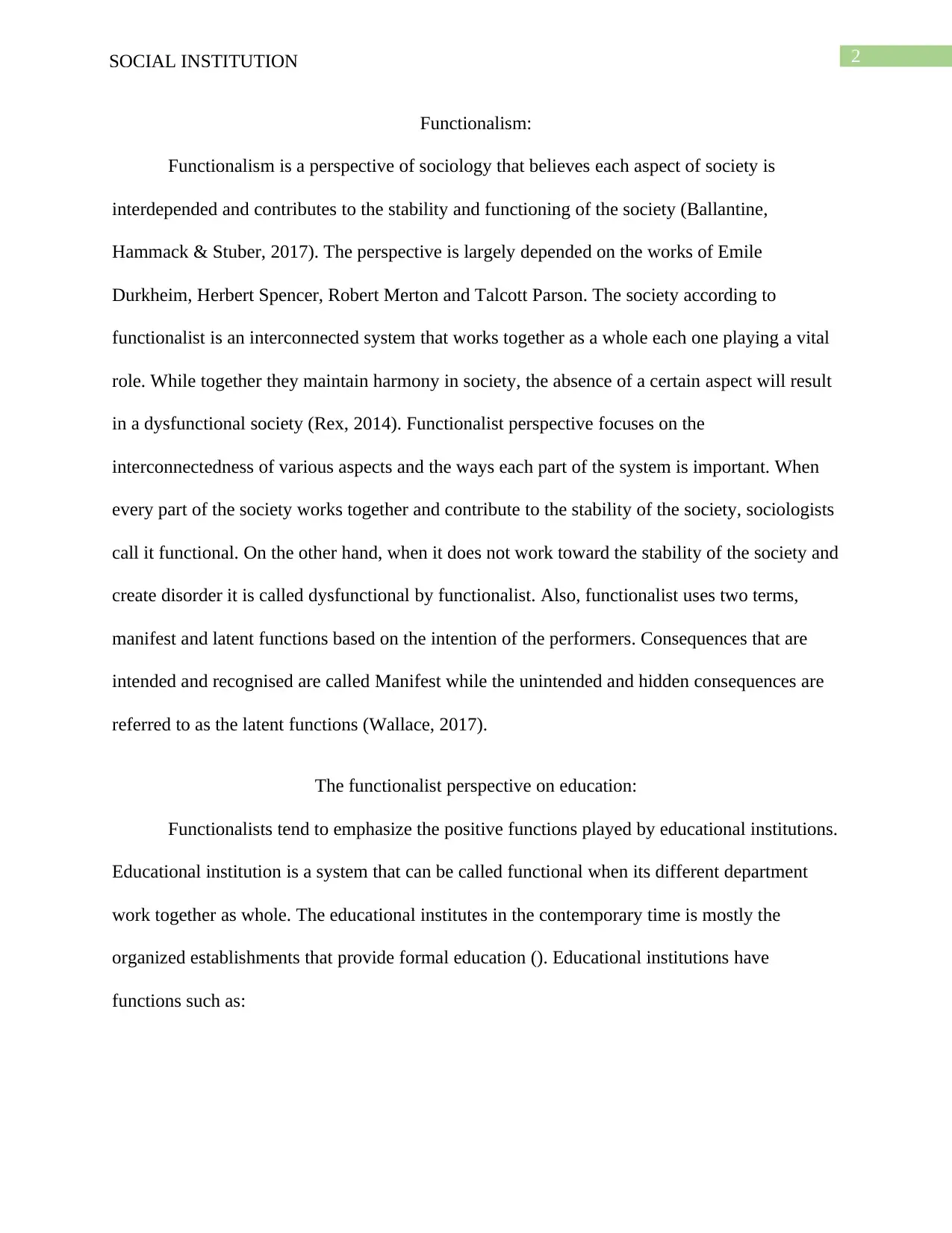
2SOCIAL INSTITUTION
Functionalism:
Functionalism is a perspective of sociology that believes each aspect of society is
interdepended and contributes to the stability and functioning of the society (Ballantine,
Hammack & Stuber, 2017). The perspective is largely depended on the works of Emile
Durkheim, Herbert Spencer, Robert Merton and Talcott Parson. The society according to
functionalist is an interconnected system that works together as a whole each one playing a vital
role. While together they maintain harmony in society, the absence of a certain aspect will result
in a dysfunctional society (Rex, 2014). Functionalist perspective focuses on the
interconnectedness of various aspects and the ways each part of the system is important. When
every part of the society works together and contribute to the stability of the society, sociologists
call it functional. On the other hand, when it does not work toward the stability of the society and
create disorder it is called dysfunctional by functionalist. Also, functionalist uses two terms,
manifest and latent functions based on the intention of the performers. Consequences that are
intended and recognised are called Manifest while the unintended and hidden consequences are
referred to as the latent functions (Wallace, 2017).
The functionalist perspective on education:
Functionalists tend to emphasize the positive functions played by educational institutions.
Educational institution is a system that can be called functional when its different department
work together as whole. The educational institutes in the contemporary time is mostly the
organized establishments that provide formal education (). Educational institutions have
functions such as:
Functionalism:
Functionalism is a perspective of sociology that believes each aspect of society is
interdepended and contributes to the stability and functioning of the society (Ballantine,
Hammack & Stuber, 2017). The perspective is largely depended on the works of Emile
Durkheim, Herbert Spencer, Robert Merton and Talcott Parson. The society according to
functionalist is an interconnected system that works together as a whole each one playing a vital
role. While together they maintain harmony in society, the absence of a certain aspect will result
in a dysfunctional society (Rex, 2014). Functionalist perspective focuses on the
interconnectedness of various aspects and the ways each part of the system is important. When
every part of the society works together and contribute to the stability of the society, sociologists
call it functional. On the other hand, when it does not work toward the stability of the society and
create disorder it is called dysfunctional by functionalist. Also, functionalist uses two terms,
manifest and latent functions based on the intention of the performers. Consequences that are
intended and recognised are called Manifest while the unintended and hidden consequences are
referred to as the latent functions (Wallace, 2017).
The functionalist perspective on education:
Functionalists tend to emphasize the positive functions played by educational institutions.
Educational institution is a system that can be called functional when its different department
work together as whole. The educational institutes in the contemporary time is mostly the
organized establishments that provide formal education (). Educational institutions have
functions such as:
⊘ This is a preview!⊘
Do you want full access?
Subscribe today to unlock all pages.

Trusted by 1+ million students worldwide
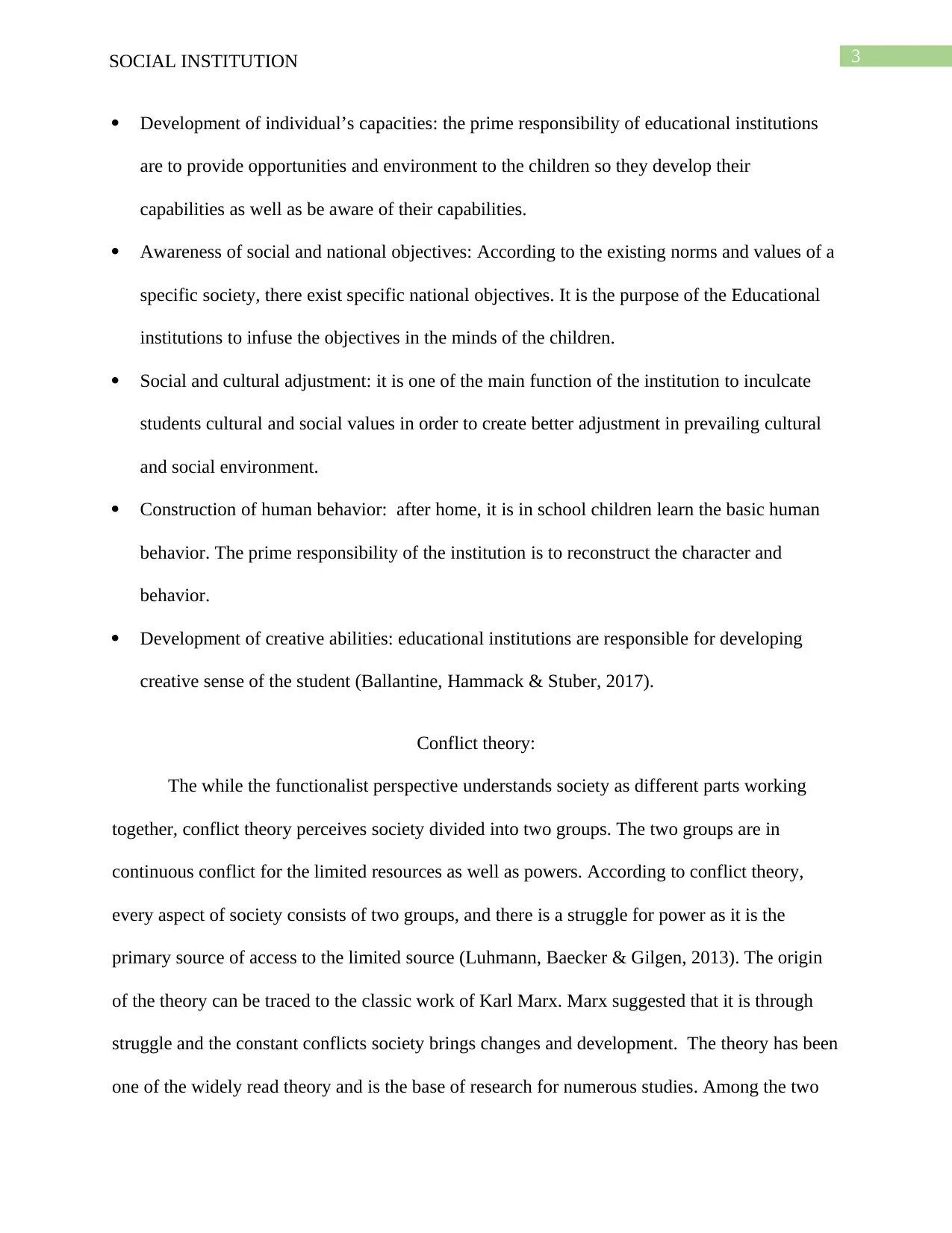
3SOCIAL INSTITUTION
Development of individual’s capacities: the prime responsibility of educational institutions
are to provide opportunities and environment to the children so they develop their
capabilities as well as be aware of their capabilities.
Awareness of social and national objectives: According to the existing norms and values of a
specific society, there exist specific national objectives. It is the purpose of the Educational
institutions to infuse the objectives in the minds of the children.
Social and cultural adjustment: it is one of the main function of the institution to inculcate
students cultural and social values in order to create better adjustment in prevailing cultural
and social environment.
Construction of human behavior: after home, it is in school children learn the basic human
behavior. The prime responsibility of the institution is to reconstruct the character and
behavior.
Development of creative abilities: educational institutions are responsible for developing
creative sense of the student (Ballantine, Hammack & Stuber, 2017).
Conflict theory:
The while the functionalist perspective understands society as different parts working
together, conflict theory perceives society divided into two groups. The two groups are in
continuous conflict for the limited resources as well as powers. According to conflict theory,
every aspect of society consists of two groups, and there is a struggle for power as it is the
primary source of access to the limited source (Luhmann, Baecker & Gilgen, 2013). The origin
of the theory can be traced to the classic work of Karl Marx. Marx suggested that it is through
struggle and the constant conflicts society brings changes and development. The theory has been
one of the widely read theory and is the base of research for numerous studies. Among the two
Development of individual’s capacities: the prime responsibility of educational institutions
are to provide opportunities and environment to the children so they develop their
capabilities as well as be aware of their capabilities.
Awareness of social and national objectives: According to the existing norms and values of a
specific society, there exist specific national objectives. It is the purpose of the Educational
institutions to infuse the objectives in the minds of the children.
Social and cultural adjustment: it is one of the main function of the institution to inculcate
students cultural and social values in order to create better adjustment in prevailing cultural
and social environment.
Construction of human behavior: after home, it is in school children learn the basic human
behavior. The prime responsibility of the institution is to reconstruct the character and
behavior.
Development of creative abilities: educational institutions are responsible for developing
creative sense of the student (Ballantine, Hammack & Stuber, 2017).
Conflict theory:
The while the functionalist perspective understands society as different parts working
together, conflict theory perceives society divided into two groups. The two groups are in
continuous conflict for the limited resources as well as powers. According to conflict theory,
every aspect of society consists of two groups, and there is a struggle for power as it is the
primary source of access to the limited source (Luhmann, Baecker & Gilgen, 2013). The origin
of the theory can be traced to the classic work of Karl Marx. Marx suggested that it is through
struggle and the constant conflicts society brings changes and development. The theory has been
one of the widely read theory and is the base of research for numerous studies. Among the two
Paraphrase This Document
Need a fresh take? Get an instant paraphrase of this document with our AI Paraphraser
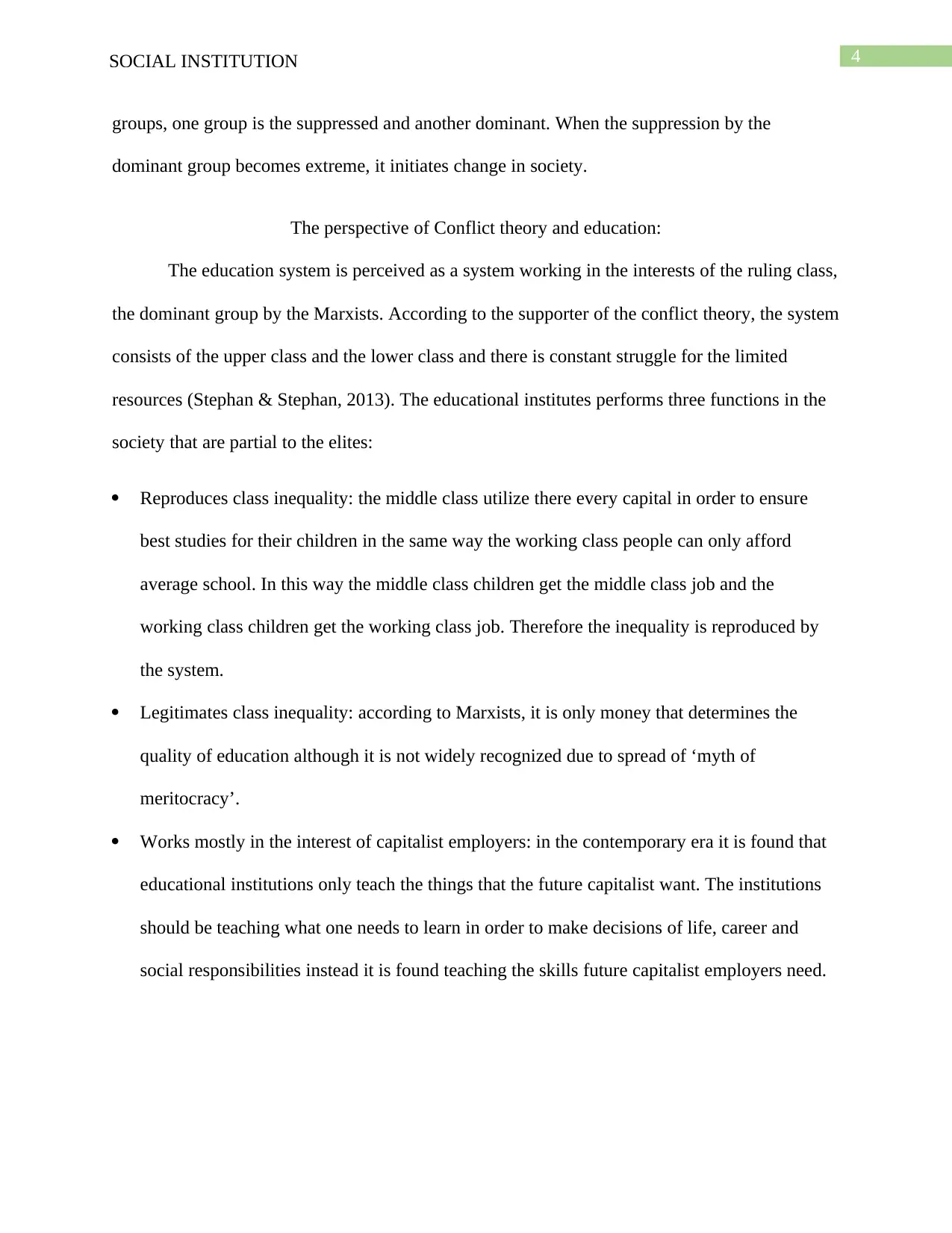
4SOCIAL INSTITUTION
groups, one group is the suppressed and another dominant. When the suppression by the
dominant group becomes extreme, it initiates change in society.
The perspective of Conflict theory and education:
The education system is perceived as a system working in the interests of the ruling class,
the dominant group by the Marxists. According to the supporter of the conflict theory, the system
consists of the upper class and the lower class and there is constant struggle for the limited
resources (Stephan & Stephan, 2013). The educational institutes performs three functions in the
society that are partial to the elites:
Reproduces class inequality: the middle class utilize there every capital in order to ensure
best studies for their children in the same way the working class people can only afford
average school. In this way the middle class children get the middle class job and the
working class children get the working class job. Therefore the inequality is reproduced by
the system.
Legitimates class inequality: according to Marxists, it is only money that determines the
quality of education although it is not widely recognized due to spread of ‘myth of
meritocracy’.
Works mostly in the interest of capitalist employers: in the contemporary era it is found that
educational institutions only teach the things that the future capitalist want. The institutions
should be teaching what one needs to learn in order to make decisions of life, career and
social responsibilities instead it is found teaching the skills future capitalist employers need.
groups, one group is the suppressed and another dominant. When the suppression by the
dominant group becomes extreme, it initiates change in society.
The perspective of Conflict theory and education:
The education system is perceived as a system working in the interests of the ruling class,
the dominant group by the Marxists. According to the supporter of the conflict theory, the system
consists of the upper class and the lower class and there is constant struggle for the limited
resources (Stephan & Stephan, 2013). The educational institutes performs three functions in the
society that are partial to the elites:
Reproduces class inequality: the middle class utilize there every capital in order to ensure
best studies for their children in the same way the working class people can only afford
average school. In this way the middle class children get the middle class job and the
working class children get the working class job. Therefore the inequality is reproduced by
the system.
Legitimates class inequality: according to Marxists, it is only money that determines the
quality of education although it is not widely recognized due to spread of ‘myth of
meritocracy’.
Works mostly in the interest of capitalist employers: in the contemporary era it is found that
educational institutions only teach the things that the future capitalist want. The institutions
should be teaching what one needs to learn in order to make decisions of life, career and
social responsibilities instead it is found teaching the skills future capitalist employers need.
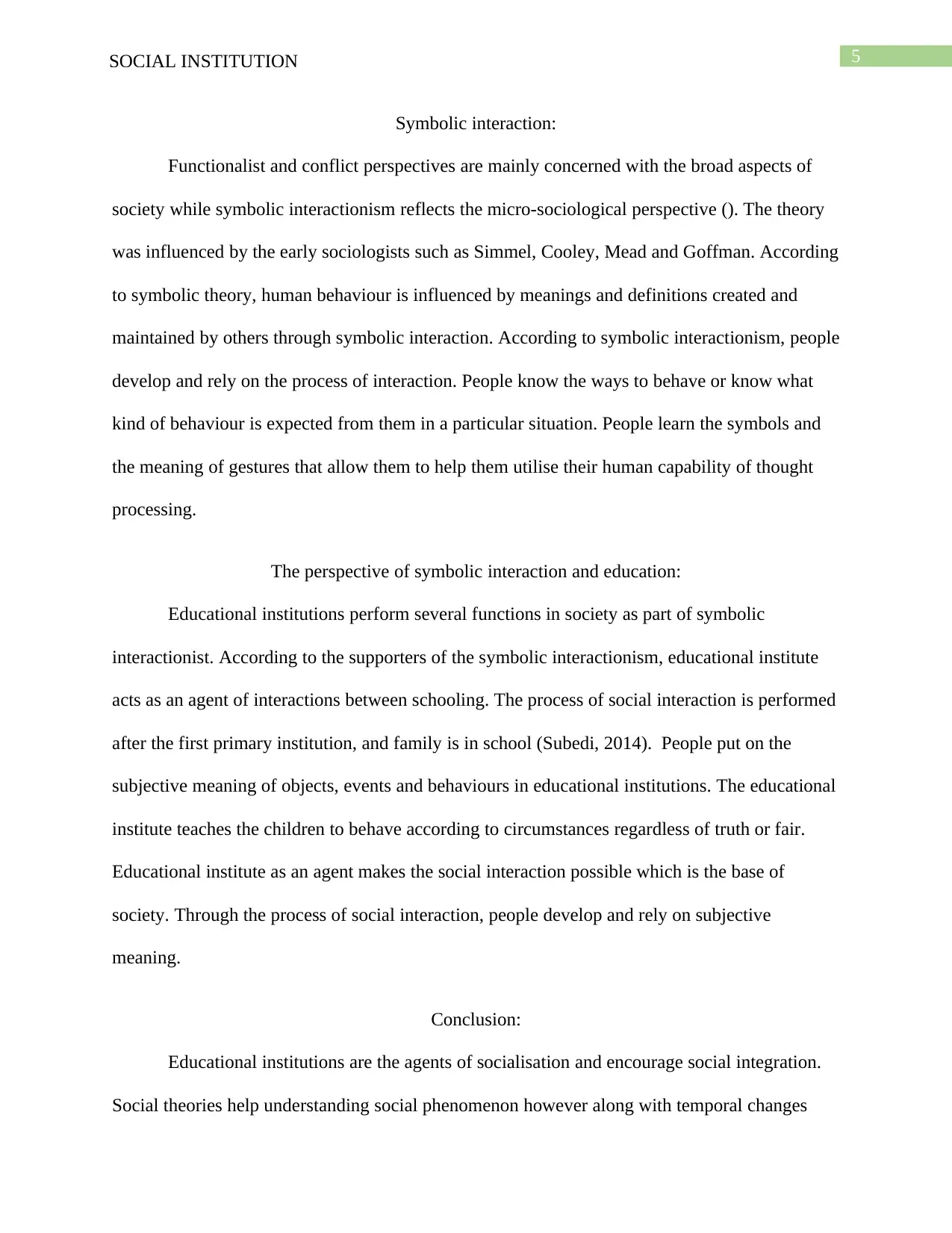
5SOCIAL INSTITUTION
Symbolic interaction:
Functionalist and conflict perspectives are mainly concerned with the broad aspects of
society while symbolic interactionism reflects the micro-sociological perspective (). The theory
was influenced by the early sociologists such as Simmel, Cooley, Mead and Goffman. According
to symbolic theory, human behaviour is influenced by meanings and definitions created and
maintained by others through symbolic interaction. According to symbolic interactionism, people
develop and rely on the process of interaction. People know the ways to behave or know what
kind of behaviour is expected from them in a particular situation. People learn the symbols and
the meaning of gestures that allow them to help them utilise their human capability of thought
processing.
The perspective of symbolic interaction and education:
Educational institutions perform several functions in society as part of symbolic
interactionist. According to the supporters of the symbolic interactionism, educational institute
acts as an agent of interactions between schooling. The process of social interaction is performed
after the first primary institution, and family is in school (Subedi, 2014). People put on the
subjective meaning of objects, events and behaviours in educational institutions. The educational
institute teaches the children to behave according to circumstances regardless of truth or fair.
Educational institute as an agent makes the social interaction possible which is the base of
society. Through the process of social interaction, people develop and rely on subjective
meaning.
Conclusion:
Educational institutions are the agents of socialisation and encourage social integration.
Social theories help understanding social phenomenon however along with temporal changes
Symbolic interaction:
Functionalist and conflict perspectives are mainly concerned with the broad aspects of
society while symbolic interactionism reflects the micro-sociological perspective (). The theory
was influenced by the early sociologists such as Simmel, Cooley, Mead and Goffman. According
to symbolic theory, human behaviour is influenced by meanings and definitions created and
maintained by others through symbolic interaction. According to symbolic interactionism, people
develop and rely on the process of interaction. People know the ways to behave or know what
kind of behaviour is expected from them in a particular situation. People learn the symbols and
the meaning of gestures that allow them to help them utilise their human capability of thought
processing.
The perspective of symbolic interaction and education:
Educational institutions perform several functions in society as part of symbolic
interactionist. According to the supporters of the symbolic interactionism, educational institute
acts as an agent of interactions between schooling. The process of social interaction is performed
after the first primary institution, and family is in school (Subedi, 2014). People put on the
subjective meaning of objects, events and behaviours in educational institutions. The educational
institute teaches the children to behave according to circumstances regardless of truth or fair.
Educational institute as an agent makes the social interaction possible which is the base of
society. Through the process of social interaction, people develop and rely on subjective
meaning.
Conclusion:
Educational institutions are the agents of socialisation and encourage social integration.
Social theories help understanding social phenomenon however along with temporal changes
⊘ This is a preview!⊘
Do you want full access?
Subscribe today to unlock all pages.

Trusted by 1+ million students worldwide
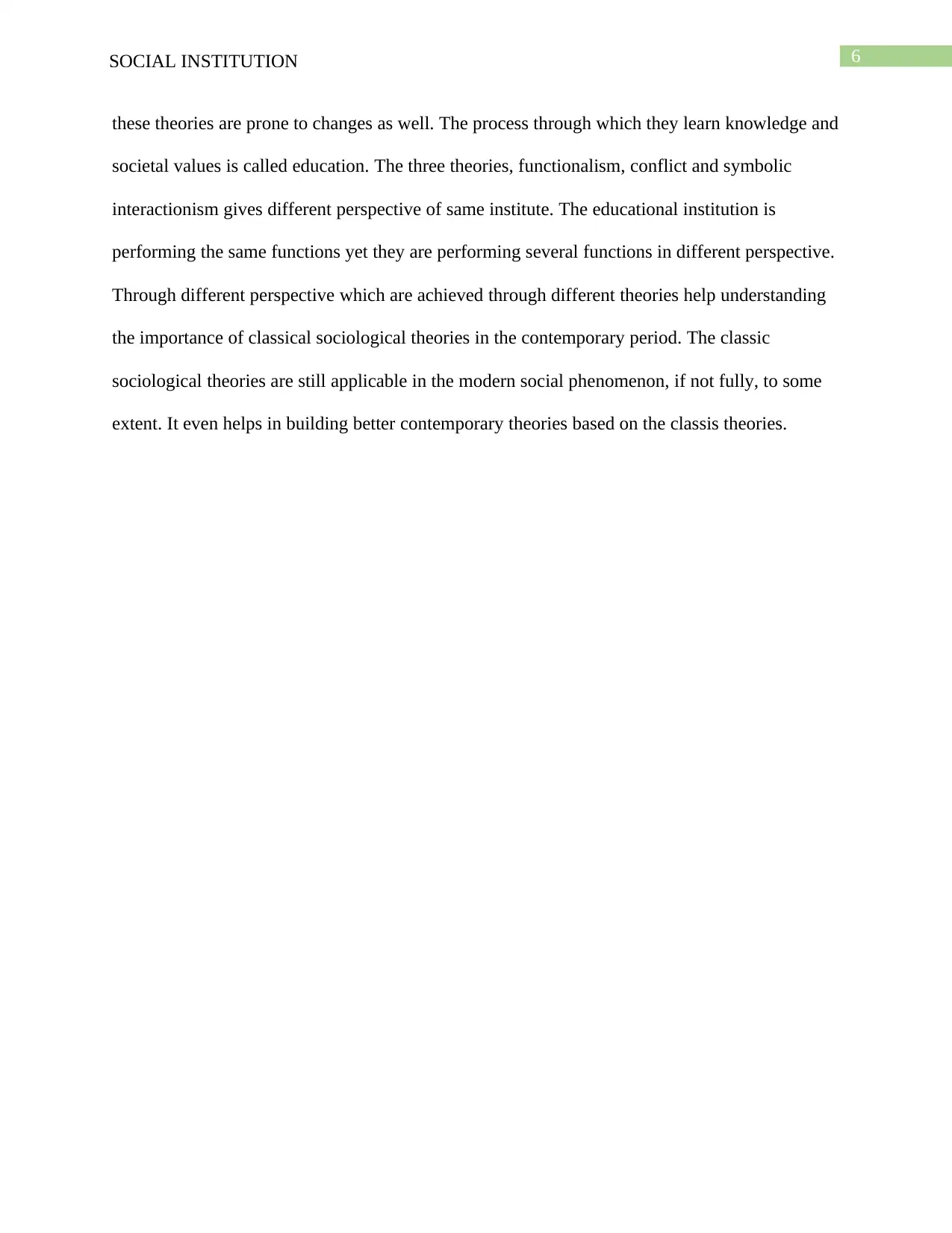
6SOCIAL INSTITUTION
these theories are prone to changes as well. The process through which they learn knowledge and
societal values is called education. The three theories, functionalism, conflict and symbolic
interactionism gives different perspective of same institute. The educational institution is
performing the same functions yet they are performing several functions in different perspective.
Through different perspective which are achieved through different theories help understanding
the importance of classical sociological theories in the contemporary period. The classic
sociological theories are still applicable in the modern social phenomenon, if not fully, to some
extent. It even helps in building better contemporary theories based on the classis theories.
these theories are prone to changes as well. The process through which they learn knowledge and
societal values is called education. The three theories, functionalism, conflict and symbolic
interactionism gives different perspective of same institute. The educational institution is
performing the same functions yet they are performing several functions in different perspective.
Through different perspective which are achieved through different theories help understanding
the importance of classical sociological theories in the contemporary period. The classic
sociological theories are still applicable in the modern social phenomenon, if not fully, to some
extent. It even helps in building better contemporary theories based on the classis theories.
Paraphrase This Document
Need a fresh take? Get an instant paraphrase of this document with our AI Paraphraser
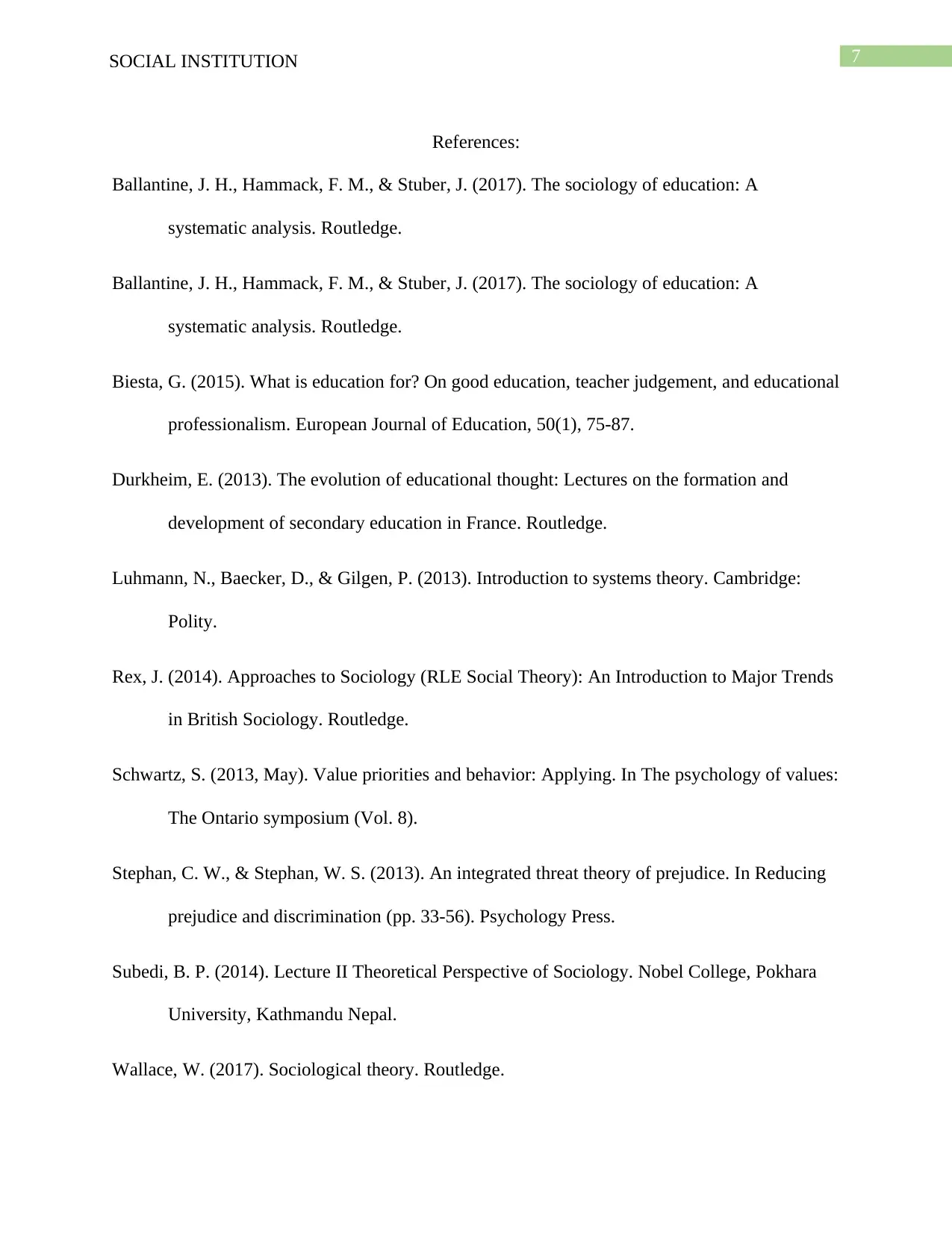
7SOCIAL INSTITUTION
References:
Ballantine, J. H., Hammack, F. M., & Stuber, J. (2017). The sociology of education: A
systematic analysis. Routledge.
Ballantine, J. H., Hammack, F. M., & Stuber, J. (2017). The sociology of education: A
systematic analysis. Routledge.
Biesta, G. (2015). What is education for? On good education, teacher judgement, and educational
professionalism. European Journal of Education, 50(1), 75-87.
Durkheim, E. (2013). The evolution of educational thought: Lectures on the formation and
development of secondary education in France. Routledge.
Luhmann, N., Baecker, D., & Gilgen, P. (2013). Introduction to systems theory. Cambridge:
Polity.
Rex, J. (2014). Approaches to Sociology (RLE Social Theory): An Introduction to Major Trends
in British Sociology. Routledge.
Schwartz, S. (2013, May). Value priorities and behavior: Applying. In The psychology of values:
The Ontario symposium (Vol. 8).
Stephan, C. W., & Stephan, W. S. (2013). An integrated threat theory of prejudice. In Reducing
prejudice and discrimination (pp. 33-56). Psychology Press.
Subedi, B. P. (2014). Lecture II Theoretical Perspective of Sociology. Nobel College, Pokhara
University, Kathmandu Nepal.
Wallace, W. (2017). Sociological theory. Routledge.
References:
Ballantine, J. H., Hammack, F. M., & Stuber, J. (2017). The sociology of education: A
systematic analysis. Routledge.
Ballantine, J. H., Hammack, F. M., & Stuber, J. (2017). The sociology of education: A
systematic analysis. Routledge.
Biesta, G. (2015). What is education for? On good education, teacher judgement, and educational
professionalism. European Journal of Education, 50(1), 75-87.
Durkheim, E. (2013). The evolution of educational thought: Lectures on the formation and
development of secondary education in France. Routledge.
Luhmann, N., Baecker, D., & Gilgen, P. (2013). Introduction to systems theory. Cambridge:
Polity.
Rex, J. (2014). Approaches to Sociology (RLE Social Theory): An Introduction to Major Trends
in British Sociology. Routledge.
Schwartz, S. (2013, May). Value priorities and behavior: Applying. In The psychology of values:
The Ontario symposium (Vol. 8).
Stephan, C. W., & Stephan, W. S. (2013). An integrated threat theory of prejudice. In Reducing
prejudice and discrimination (pp. 33-56). Psychology Press.
Subedi, B. P. (2014). Lecture II Theoretical Perspective of Sociology. Nobel College, Pokhara
University, Kathmandu Nepal.
Wallace, W. (2017). Sociological theory. Routledge.
1 out of 8
Related Documents
Your All-in-One AI-Powered Toolkit for Academic Success.
+13062052269
info@desklib.com
Available 24*7 on WhatsApp / Email
![[object Object]](/_next/static/media/star-bottom.7253800d.svg)
Unlock your academic potential
Copyright © 2020–2026 A2Z Services. All Rights Reserved. Developed and managed by ZUCOL.




